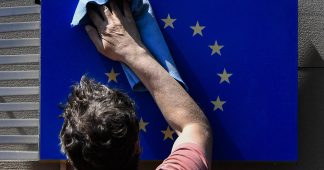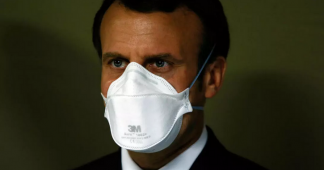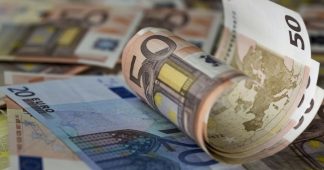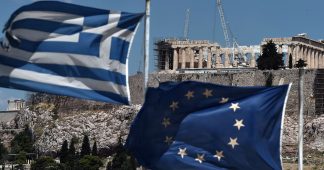In recent years, the air of optimism surrounding the European Union has been replaced by continual crisis management. Yet the pandemic, the financial crisis, and Brexit have all spurred even further integration — and the Left lacks a coherent response.
By Tatu Ahponen
Sep.12, 2020
Such statements have been familiar to Europeans for decades now, as the continent has lurched from one crisis meeting to another. Yet, this time, the negotiations and their end result have revealed the bare truth of the European project — a continent of squabbling nations advocating for their national interests (as the interests of the businesses in those countries are commonly called), pushed from above toward federalization and a new superpower.
For a time, it was smooth sailing for European integration — the ever-closer union, the market-based European project that would, in the eyes of first its most far-reaching visionaries and then the wider European ruling class, lead to a European federation. It first proceeded from the European Coal and Steel Union to the European Community, then got a major boost from the fall of the Soviet Union, as the supposed death of ideology gave way to the idea of a European Union as a culmination of sensible cosmopolitan liberalism — a guardian of reasonably free minds and reasonably free markets after the end of fascism and communism.
During the last ten years, this vision has suffered some major challenges. Instead of continuous uninterrupted progress, the modern European Union has had to follow the path of crisis management. The Great Recession led to the sovereign debt crisis, then the Portuguese crisis, the Spanish crisis, the Irish crisis, and, of course, most drastically, the Greek crisis. The talk of a “Grexit” — the possibility of the other countries booting Greece from the Union — smoothly transferred to talk on the crisis over Brexit, as the British right actually split their country from the union. This, at the same time as the mounting environmental crisis, the so-called refugee crisis, the crisis of democracy caused by right-wing populism in countries like Hungary and Poland. But from crisis to crisis, the Union lurches forward, and the solution is always the same — more integration.
So, what then of its response to the pandemic — a challenge of unprecedented proportions? Of course, what is going on in is not just a public health drama, but also reflects the preceding economic problems. While leaders like Macron pontificated about the greater European mission, the media discourse on the bailout negotiations concentrated on how the various EU member states, through their leaders, went through fights, agreements, playing media games for the home crew and defining new divisions for the Union. There’s nothing new about this. And yet there is something different about the end result of this first major post-Brexit crisis conference. The mammoth €750 billion package opens the door to common debt mechanisms and EU taxation, yet another leap toward the federalization of Europe — and not a minor one.
The various politicians and civil servants in Brussels have no problem with this, of course. They still tend to believe in the mission of Europe to unite; slogans range from high-minded liberal appeals to peace and environment. But for the opponents of integration — the Eurosceptics — this is more of a nightmare than a dream; nationalists appeal to the preservation of their nations in the face of Brussels cosmopolitanism, but even many left-wingers have worried whether the undemocratic integration process would simply serve the purposes of Western global domination and lock adverse capitalist norms into place forever and ever.
In the Dragon’s Cave
But local discussions in European member states, at least the richer, Northern ones — such as my own homeland, Finland — have mainly revolved around a simple cost-benefit analysis. How much will each country pay and how many supposed economic benefits will be received? After the flash of idealistic pro-EU enthusiasm in the 1990s, such pragmatic considerations have always been more important to Finns than any grander visions of European integration as a positive good in itself. In the view of the country’s citizens, the European Union is mostly a union of convenience, where the benefits of the relationship are the central point. Such benefits can, of course, range from the ease of trade to the possibility of going on a vacation in the Mediterranean visa-free when it gets too cold up North.
During summits, this instrumentalist view becomes the most apparent. In the popular press of Finland, the main topic was simple. How much will Finland get out of this deal — and how much will it pay? The way the press treated these negotiations brought to mind an image of the Union as a cave full of dragons, where the local champion — in this case, Finnish premier Sanna Marin, leading the current center-left government — would venture. Sometimes, the brave knights — an individual member state’s top-level national and diplomatic leadership — succeed in stealing the dragon’s treasures, while at other times they lose their gear to the beast.
The knights don’t go into the lair alone, of course. Another thing the press likes to do is to divide Europe into convenient blocs. Populations of countries like Finland are, time and again, led to believe that the problem with the European Union is that there are too many Mediterranean countries in it, that everything would be okay if the EU could just somehow drop or at least ignore the Southern countries for their profligacy. The name of choice for the Northern nations for the negotiations was the “frugal four,” part of the former “New Hanseatic League.” This group set out to oppose the package, eventually getting some concessions, but in the end having little effect on the basic forms of the package itself.
Traditionally, one of Britain’s main roles in the Union — in addition to obtaining benefits of its own and serving Transatlantic interests — was operating as such a brake. Some Eurosceptics have predicted that Brexit would lead to a wave of similar fervor for quitting the union in most countries. But not only has Brexit failed to fulfill any of the social promises portrayed as hinging on Union membership, but it has offered the EU elites all the weapons they need to accelerate the process of antidemocratic federalization. The example of Britain – endless confusion, negotiation after negotiation, predicted catastrophes — has created a wave of pro-European feeling not unlike patriotism; such pro-Europeanism will as surely be exploited by European elites for their own goals as pro-Brexit patriotism was exploited by Tories keep themselves in power.
One might have expected that this package would, at least, have led to a similar wave of strong Euroscepticism rising in countries traditionally bent on preventing their sovereignty. There were, of course, some minor adjustments to allow everyone to claim a victory, of sorts, to prevent this. Finland, for instance, received a package of agricultural subsidies — tailor-made to satisfy the Centre Party, the rural-based party that had been skeptical of the package. Still, as premier Marin has stated Finland ended up paying more than it would receive, as it is one of the richer countries.
This was intolerable for Finnish conservatives, who made themselves heard loudly, so loudly that one might have expected Finns as a whole to reject the deal conclusively. Actual polling shows, though, that most Finns can accept the deal — though even then, the devil is in the details. While one-quarter of respondents say they approve of the deal as is and one-quarter say that it should have been rejected, approximately 40 percent say that they disapprove of the deal — but believe approving it to be the best of bad alternatives. This reflects a muddled position, not fully on either side. Most Northerners, and most Europeans in general, continue to support the EU in its current form: a glorified trade pact, something more than a confederation, something less than a federation.
The Right Has No Answers
This isn’t really a matter of the so-called political families within the European sphere. In the “Northern” group, the Austrian conservative Sebastian Kurz joined the Dutch liberal Mark Rutte and the social democrats in Nordic countries, such as Finland’s Marin, to oppose the social democrat Pedro Sánchez in Spain, the conservative Angela Merkel in Germany, and — stretching the meaning of the word quite a bit — the “liberal” Macron in France. The one country in the EU that currently has the far right in government is Estonia, where the nationalist EKRE party has talked tough about the EU and federalism. But in the end, it presented no effective opposition to the package, after Estonia was promised a windfall of EU subsidies as a result. Other right-wing populists, like Matteo Salvini in Italy, muted their criticisms even longer ago.
It has been more of a rule than an exception that previously anti-EU right-wing populists, once in government, suddenly realize that what they want to do is change the EU, not junk it. Of course, this changed EU would not represent a “social Europe,” but rather a Europe that would use its powers in a “tougher” way against immigrants and other such perceived menaces. Liberals who might view the EU as a tool for enforcing liberal values on countries like Poland and Hungary rarely seem to consider the possibility that the EU might end up becoming a tool for the Right to impose the values of the Polish and Hungarian governments on the rest of Europe.
The Finns Party, Finland’s nationalist party, has traditionally talked a big game about challenging the Union. Indeed, what made them a major party was opposing the previous major bailouts — the Greek bailout and the Portuguese bailout, where they could fully acquire the mantle of anti-bank and anti-Southern anger when in opposition. Once in power, however, in 2015–17, there was not a eurocent’s worth of difference in the EU policy they accepted in comparison to the previous governments. Now, once safely out of power, they simply blamed the politicians participating in the previous government and have returned to Eurosceptic attacks, characterizing the European Union as the new Soviet Union and accusing the government of putting the interests of Italian bankers before Finnish workers. Despite this, the same questions remain as before — should they regain power, what would they do differently, if anything? From the narrow viewpoint of national interest, how, if anything, has Brexit served the interests of Great Britain — and what, in practice, has even changed?
Troubles for the Left
Yet the Left is similarly lacking in a vision that goes beyond the next crisis. Since at least the 1980s, most of the European left, both social-democratic and socialist, has defined its mission as a pro-European project. While it is acknowledged that the European Union, as it is currently run, mainly serves the interests of the same neoliberal forces and corporations it has done throughout its existence, it is also seen as offering a possibility for improving welfare, corporate regulations, and similar on a more effective, continental scale. Currently, one of the main forces advancing this argument are the Greens, who see the EU as offering possibilities for strong climate action. Despite this, most fiscally “frugal” countries, critical of bailout measures for the South, had Greens either in government or as supporting governmental parties.
Nevertheless, particularly in Northern Europe, there continues to be a significant Eurosceptic faction that views the EU as nothing more than a plot for facilitating business interests and maintaining capitalist power. Of course, the most visible, if still minor, component of these were those who advocated a so-called “Lexit” during the Brexit debate — a largely poorly defined plan to withdraw Britain from the European Union in a left-wing way, or at least differently from how the ruling Tories planned to do it. Such fare was left mainly to minor Trotskyist and communist parties, even if similar sentiments have also existed for a long time in large parts of Labour. Nevertheless, even beyond Britain, a Euroskeptic left continues to play a role around Europe. In Finland, MP Markus Mustajärvi, representing the traditional socialist wing of the Left Alliance, penned a column condemning the deal as evidence that the EU is suffering from a “collective delusion.”
In truth, one delusion has been the idea that either the left-federalist or Lexit camps have ever managed to create a perspective that would not have, in practice, ended up playing second fiddle to the liberals and nationalists. For instance, the Party of the European Left ended up with a commentary that amounts to a criticism of the grants in the bailout package being reduced from €500 billion to €390 billion — a far cry from analysis of the most meaningful changes the new package presents to the EU.
The European left statement, in the grand tradition of milquetoast left commentary, refers to a “Social Europe.” No clear explanation has ever been offered as to what “Social Europe” would, in practice, mean — and even now, the compromise that the social-democratic parties in the “frugal four” countries could present to their supporters was concentrated on removing the social features from the bailout. Lexiteers, in practice, never really could make a clear difference to right-wing Brexiteers, who they often ended up working with — though, of course, this also shows how much the right wing had successfully succeeded in utilizing tactically situated anticapitalist rhetoric to their own ends.
When the Left attempts to combine these two perspectives, it more often than not ends up with a paradox: the EU is a neoliberal apparatus that stomps on the working class, so it needs more powers and integration, pronto. And the one thing that certainly would not help is attempting to sidestep the debate on the structures or claim it is merely a culture war; it is something the people are clearly interested in, something they believe, and often with a good reason, to affect their lives in a clear material way. Insufficient countering of such accusations of fence-sitting played, among other factors, a large role in the eventual defeat of the Corbyn wing in Labour.
We Need Something More
While European integration is proceeding, it simultaneously continues to be at an impasse. As national leaders squabble and citizens take an instrumental view of Union membership, the large process of ever-expanding federalization goes forward regardless; it just does it in a non-open, nondemocratic way, crisis to crisis, always going a little bit forward. One day, the continent will simply find itself united by stealth, with politicians, who should have taken a stand on it in advance, not daring to tell their own view, not even knowing their own view, or not knowing anything about anything.
In the end, however, the conversation acutely needs to move forward — not only from parochial thinking that only concentrates on narrow national interests, but also from a view that only looks at Europe. For instance, a common argument used to sell European integration is its necessity in solving global crises – economic crisis, the likes of the coronavirus crisis, but perhaps most acutely the climate crisis. However, solving the climate crisis is not, fundamentally, a question of political structures. There’s not even a guarantee that it would do more than the current system without political pressure to advance this.
Even a federal Europe would not, as such, alter the underlying economic systems leading to more and more environmental destruction in search of personal and national profits. Indeed, once one looks under the hood of the European liberalism’s internationalist rhetoric, the practical work of European integration is often advanced by the same inward-looking arguments as nationalism always has been: the idea of a continent threatened by, say, China or Russia, or international terrorism. Indeed, when looking at Macron talking about the “cultural vitality” (though not the values) of Hungary and Russia as a model for his preferred European “civilization state,” or Belgian liberal Guy Verhofstadt — for decades almost the living personification of the EU — literally referring to an “EU empire,” one wonders whether the idea of a European federation guided by the values of the Polish or Hungarian governments is as far off as one might think, even now.
Without a strong socialist movement, even a united Europe would be subjected to the same pressures of capitalism as every other possible arrangement imaginable. The real power of democratic decision-making would always be constricted by the powers of capital, with threats of industries moving to and fro almost seemingly at the snap of a finger lingering in the minds of voters and politicians. Global crises require global solutions, and global solutions cannot happen on a merely European scale. Nationalism cannot solve these crises, and pan-European nationalism is no exception
Published at www.jacobinmag.com











